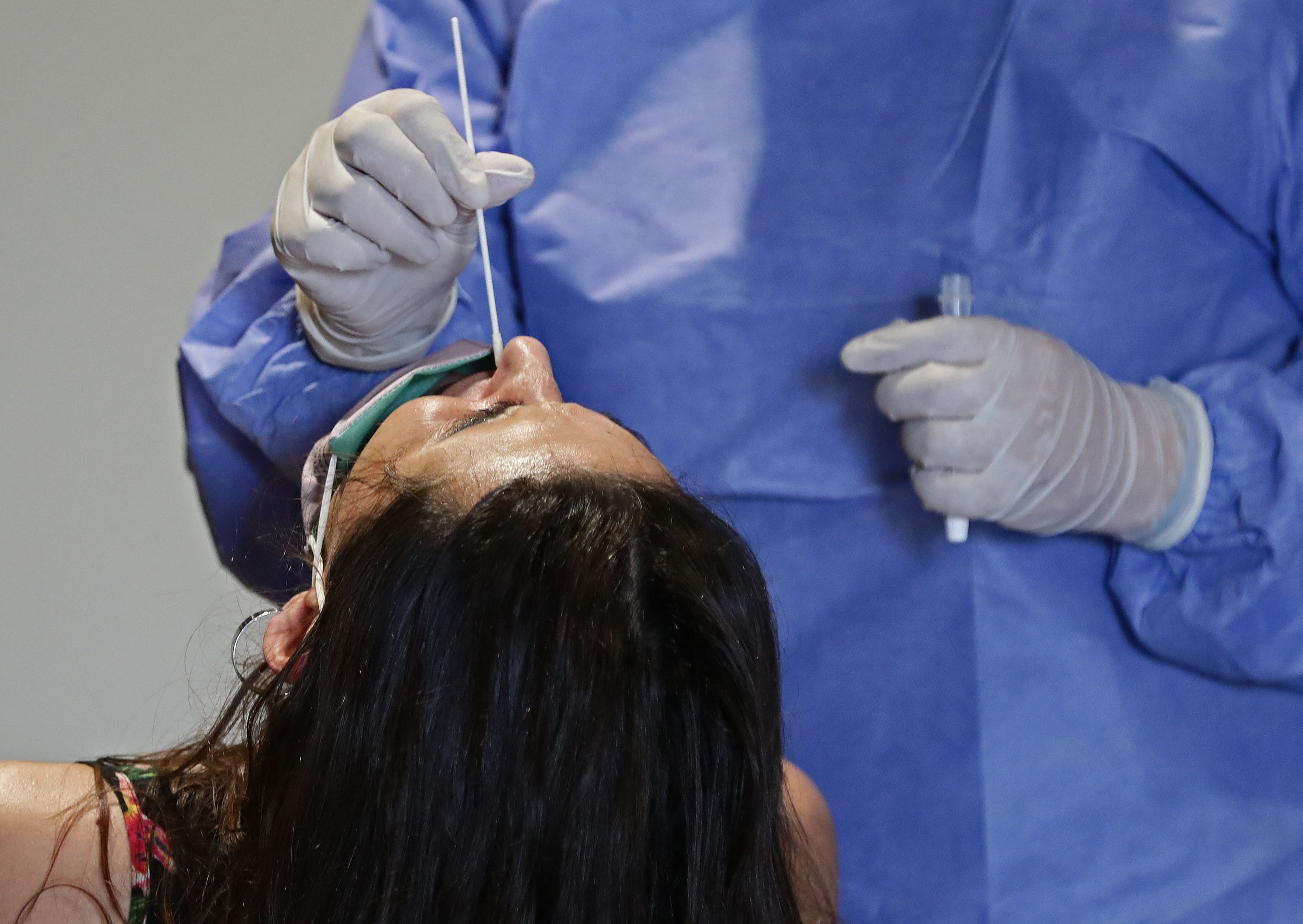Omicron surge raises Covid-19 reinfection concern
Sign up now: Get ST's newsletters delivered to your inbox

It is estimated that between 10 per cent and 15 per cent of Omicron cases were among people who had already been infected with another variant.
PHOTO: AFP
LONDON (FINANCIAL TIMES) - With Omicron spreading across the world faster than any previous variant, cases of reinfection among people who caught Covid-19 earlier in the pandemic are rising.
Professor Neil Ferguson, epidemiologist at Imperial College London, estimated last week that between 10 per cent and 15 per cent of Omicron cases were among people who had already been infected with another variant.
Other scientists have called this a plausible estimate.
Almost all reinfections so far will have been of people who originally caught another strain of the Sars-Cov-2 virus. No evidence has yet been found of anyone being infected twice by Omicron itself, including from South Africa where this latest variant of concern has been circulating longest - for at least two months.
But health officials worry that Omicron's increased transmissibility and ability to evade immunity protection will lead to cases of reinfection with the same variant. They are also concerned about co-infection - simultaneous infection with Omicron and another variant - in this phase of the pandemic.
Trinity College Dublin's professor of experimental immunology Kingston Mills said it was too early for people infected with Omicron to have cleared the virus and then caught it again.
"The test will come in six months' time when we know whether people who have had Omicron will be reinfected with Omicron," Prof Mills said. "My guess is that if they've been vaccinated, they won't, but if they haven't been vaccinated, there's a chance that they will."
All current evidence for reinfection with Sars-Cov-2 comes from people who had been infected with Delta and other variants - but here, the data is incomplete.
Some of the world's best evidence comes from the UK Health Security Agency (UKHSA), which said last Thursday (Jan 6) that its latest available data had identified 268,517 "possible reinfections" in England - defined as a positive Covid-19 test at least 90 days after a previous positive - compared with 11.1 million primary infections since the beginning of the pandemic.
Over the week to Jan 2, when England had about one million Covid-19 cases, UKHSA identified 59,783 possible reinfections. But only a full genomic analysis can prove that a case is a true reinfection, in which someone completely cleared the virus and was infected again.
Population-based studies probably underestimate the prevalence of reinfection because many second infections are mild and transient, without producing symptoms.
Various studies have shown that a first infection with Sars-Cov-2 provides good immune protection against illness if you are reinfected with another strain of the virus such as Omicron. Indeed, evidence including an Imperial College study published on Monday shows that other coronaviruses, which cause common colds, afford some protection.
"Natural infection may provide better cross-reactive immunity than current Covid-19 vaccines against other variants, because it produces T-cells that recognise internal proteins in the virus as well as the spike proteins," said professor of immunology Charles Bangham at Imperial College London.
Although reinfections are usually less severe than first infections, they can still be fatal, especially for unvaccinated people. The first reported Omicron death in the United States was of a man in his fifties previously infected with Covid-19 but not vaccinated.
Prof Bangham warned against relying on natural immunity alone to defend against Covid-19. "You should take the vaccines offered to you because they will greatly enhance your immune protection," he said.
Reinfection appears to be more common among children than adults.
"Primary schoolchildren have much lower or no immunity from vaccination in most countries," said Prof Mills. "So the most vulnerable to infection are the four- to 11-year-olds, then the adolescent groups that haven't been boosted are the next most vulnerable."
Much less common than reinfection is co-infection - infection with two strains at the same time.
University of Nottingham's assistant professor of infection immunology Christopher Coleman said: "Viruses tend to prevent competition because when a virus infects a cell it doesn't want another virus there taking away all its resources. It makes changes to the cell that make it less tempting for another virus to latch on to our cells."
The human inflammatory response to infection may also block entry by other viruses.
"On a biological level, even if you may have very mild symptoms, your immune system is going into overdrive and taking lots of protective measures, making it really hard for another virus to come in and infect you while you have any infection," said Prof Coleman.
The prospect of co-infection concerns some virologists, however, because the two strains may swop genes through a genetic recombination process, raising the risk of dangerous new variants evolving. Scientists hope, therefore, that the more transmissible Omicron will have enough selective advantage over Delta and other variants to replace rather than coexist with them.
A recent unpublished study in South Africa suggested this was likely to happen. It found that blood plasma taken from Omicron patients not only neutralised Omicron itself, lowering the chance of reinfection with the same variant, but also showed substantially increased neutralisation of Delta, making reinfection with that variant less likely.
"These results are consistent with Omicron displacing the Delta variant," the researchers said.
In the longer term, most virologists and immunologists expect Sars-Cov-2 to become an endemic virus reinfecting people periodically for the indefinite future, as it mutates and the immune protection slowly weakens with time - like other respiratory pathogens, including the four other human coronaviruses that cause mild colds and sniffles. Reinfection would only cause serious illness in a very few people.
"There is good reason to believe that the virus will reinfect us every couple of years or so but our immune system, particularly T-cells, will still provide good protection against severe disease," said Prof Bangham.


